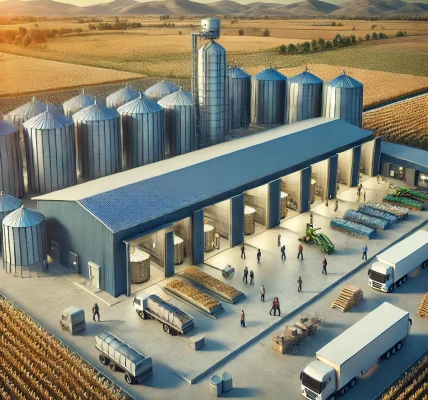Introduction
Agriculture in India is undergoing a technological revolution driven by agri-startups that introduce modern techniques such as precision farming, vertical farming, hydroponics, and AI-driven solutions. These new-age farming entrepreneurs are transforming the agricultural sector by increasing efficiency, reducing waste, and improving overall productivity.
To support and promote agri-startups, the Government of India has launched multiple schemes offering funding, subsidies, and incubation support. In this blog, we will explore the top government schemes that provide financial and technical assistance to agri-startups, how to apply for them, and their benefits.
Why Agri-Startups Are Important for India’s Agriculture?
1. Technology-Driven Growth
Agri-startups use AI, IoT, drones, and blockchain to improve farming techniques and supply chain efficiency.
2. Sustainability & Climate-Resilient Farming
With climate change affecting crop yields, vertical farming, hydroponics, and precision agriculture ensure sustainable food production.
3. Increased Employment in Rural Areas
By setting up processing units, smart irrigation solutions, and agri-business centers, startups create jobs in rural India.
4. Better Market Access for Farmers
Startups enable direct farm-to-market models, helping farmers get better prices and reducing middlemen dependency.
Top Government Schemes Supporting Agri-Startups
1. Rashtriya Krishi Vikas Yojana (RKVY) – RAFTAAR
(Remunerative Approaches for Agriculture and Allied Sectors Rejuvenation)
- Objective: Supports agri-startups with financial assistance and business incubation.
- Funding: Up to ₹25 lakh for startups in the idea and seed-stage.
- Eligibility: Agri-startups, FPOs, young entrepreneurs.
- How to Apply? Applications can be submitted via State Agricultural Departments or incubation centers approved by RKVY-RAFTAAR.
2. Agri-Clinic and Agri-Business Centres (ACABC) Scheme
- Objective: Provides financial support and training to entrepreneurs starting an agriculture-related business.
- Funding: Up to ₹20 lakh for individuals and ₹1 crore for FPOs.
- Eligibility: Agri-graduates, diploma holders, and farmers.
- How to Apply? Applications through NABARD-accredited training centers.
3. National Agriculture Market (e-NAM)
- Objective: A digital platform that connects farmers with buyers directly to ensure fair pricing and eliminate middlemen.
- Benefits for Startups: Helps agri-tech startups offer innovative market linkage solutions.
- How to Apply? Register as a service provider on e-NAM’s official website.
4. Startup India Initiative for Agri-Tech
- Objective: Provides financial assistance, mentorship, and tax benefits to agri-startups.
- Benefits: 3-year tax exemption, easy loans, and access to government tenders.
- How to Apply? Register on the Startup India portal and submit a business plan.
5. National Bank for Agriculture and Rural Development (NABARD) Agri-Startup Fund
- Objective: Financial aid for early-stage and growth-stage agri-startups.
- Funding: Equity investments of ₹5 crore to ₹15 crore.
- How to Apply? Submit proposals through NABARD’s official website or partner incubators.
6. Pradhan Mantri Formalization of Micro Food Processing Enterprises (PM-FME) Scheme
- Objective: Supports small-scale food processing startups.
- Funding: 35% subsidy (up to ₹10 lakh) for setting up processing units.
- Who Can Apply? Agri-startups involved in value addition and food processing.
- Application Mode: Apply online via MSME or Agriculture Ministry portals.
7. Small Farmers Agribusiness Consortium (SFAC) Venture Capital Assistance (VCA) Scheme
- Objective: Helps agri-startups and FPOs get working capital for expansion.
- Funding: Up to ₹5 crore.
- Eligibility: Agri-business firms and farmer cooperatives.
- How to Apply? Submit applications via SFAC’s website.
8. National Livestock Mission (NLM) for Agri-Startups
- Objective: Supports startups in dairy, poultry, and animal husbandry.
- Funding: Subsidies and grants for infrastructure and equipment.
- How to Apply? Applications through State Animal Husbandry Departments.
9. Dairy Entrepreneurship Development Scheme (DEDS)
- Objective: Supports startups in dairy farming, cold storage, and processing.
- Funding: 25–33% subsidy on project costs.
- Eligibility: Dairy farmers, agri-entrepreneurs, cooperatives.
- Application Process: Apply through NABARD-affiliated banks.
10. Solar Energy Support for Agri-Startups (PM-KUSUM)
- Objective: Provides solar power solutions for agribusiness.
- Benefits: Subsidized solar pumps, panels, and grid connections.
- How to Apply? Applications through State Renewable Energy Agencies.
How to Apply for Government Schemes?
- Identify the Right Scheme – Choose the program that aligns with your startup.
- Prepare a Business Plan – Include cost estimates, expected revenue, and scalability potential.
- Register on Government Portals – Like Startup India, NABARD, or SFAC.
- Submit Required Documents – Business registration, project reports, and financial statements.
- Await Approval & Funding Disbursement – Some schemes require inspection before fund allocation.
Benefits of Government Support for Agri-Startups
✅ Financial Assistance & Subsidies – Reduce startup costs significantly. ✅ Market Access & Technology Adoption – Helps in scaling and innovation. ✅ Sustainability & Modernization – Encourages climate-smart farming solutions. ✅ Employment Generation – Supports rural development through job creation.
Conclusion
The Indian government is actively supporting agri-startups through financial aid, tax benefits, and business incubation programs. Entrepreneurs looking to enter the agriculture sector should take advantage of these schemes to build sustainable and profitable businesses.
If you are an aspiring agri-entrepreneur, start exploring the schemes mentioned above and apply for funding today to turn your innovative ideas into reality!
FAQs
1. What is the best government scheme for agri-startups?
RKVY-RAFTAAR and NABARD Agri-Startup Fund are among the most beneficial.
2. How can I register my agri-startup under Startup India?
Visit the Startup India portal, complete registration, and submit your business plan.
3. Is funding available for hydroponics and vertical farming startups?
Yes! Schemes like MIDH and NABARD support modern farming ventures.
4. Do I need collateral for availing loans under these schemes?
Many schemes offer collateral-free loans for startups.
5. Are state-specific schemes available for agri-startups?
Yes! States like Maharashtra, Karnataka, and Telangana offer additional incentives.




